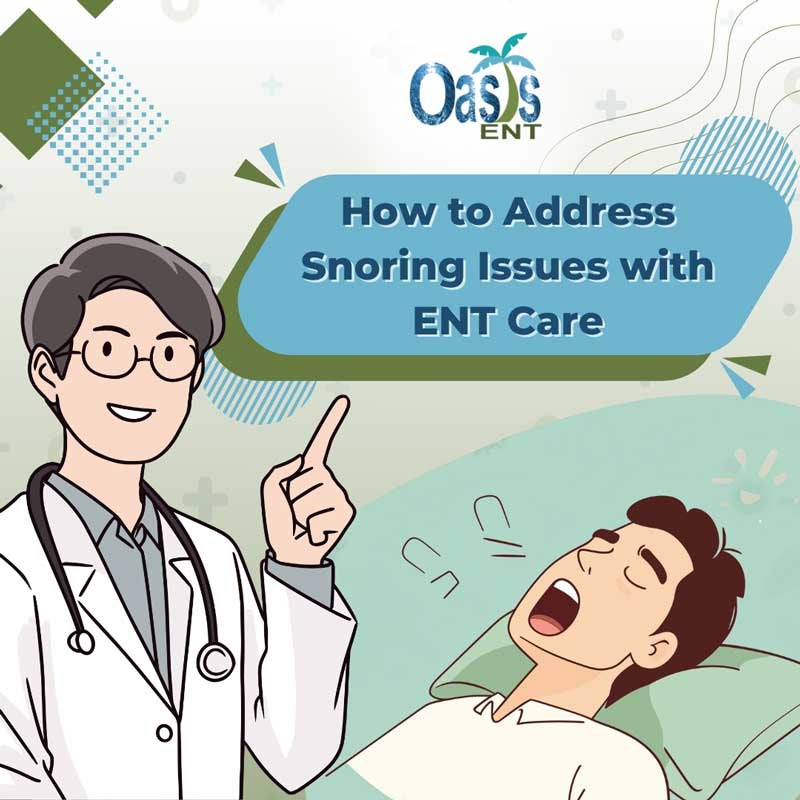How to Address Snoring Issues with ENT Care
Let’s be honest—snoring isn’t just annoying. It can destroy relationships, wreck your sleep quality, and signal deeper health problems. If you’re keeping your partner awake every night or waking up feeling exhausted despite sleeping, you’re not alone.
Oasis ENT sees patients every day in Surprise, AZ who are frustrated with snoring that seems impossible to control. What most people don’t realize is that snoring isn’t just a nuisance—it can be a warning sign of serious conditions like sleep apnea, nasal obstruction, or chronic congestion. Your nightly symphony of snores might be your body’s way of telling you something isn’t quite right with your breathing.

Why Do People Snore?
Snoring happens when air struggles to pass through the throat and nasal passages during sleep. This creates vibrations in the tissues of the airway, leading to the familiar sound of snoring. Several factors can contribute to this:
- Nasal congestion – Allergies, sinus infections, or a deviated septum can block airflow.
- Obstructive sleep apnea (OSA) – This condition causes the airway to collapse during sleep, leading to pauses in breathing.
- Enlarged tonsils or adenoids – These can partially block the airway, especially in children.
- Obesity – Extra weight around the neck can put pressure on the airway.
- Sleep position – Sleeping on your back can make snoring worse.
When to See an ENT for Snoring
Occasional snoring isn’t usually a cause for concern, but frequent loud snoring could be a sign of a more serious issue. You should consider seeing an ENT if you experience:
- Gasping or choking sounds during sleep
- Daytime fatigue or trouble concentrating
- Chronic nasal congestion or breathing issues
- A dry mouth or sore throat in the morning
These symptoms may indicate sleep apnea or another airway obstruction that needs medical attention.
Treatment Options
If snoring is linked to a nasal or throat issue, an ENT can recommend treatments to improve airflow. Some common solutions include:
- Treating Nasal Congestion
If allergies or sinus problems are causing snoring, treating the underlying issue may help. This could include antihistamines, decongestants, or nasal sprays. In some cases, an ENT may suggest sinus procedures to open up blocked airways.
- Lifestyle Changes
For some people, small adjustments can make a big difference. Losing weight, avoiding alcohol before bed, or changing sleep positions may help reduce snoring.
- Oral or Nasal Devices
Mouthpieces that reposition the jaw or nasal strips that open nasal passages can improve airflow. An ENT can determine if these are good options for you.
- CPAP Therapy for Sleep Apnea
If snoring is linked to sleep apnea, a CPAP (Continuous Positive Airway Pressure) machine may be recommended. This device keeps the airway open by delivering a steady flow of air through a mask.
- Surgical Options
In cases where other treatments don’t work, procedures to remove airway obstructions, such as tonsil removal or nasal surgery, may be considered.
If snoring is affecting your sleep or overall health, it may be time to talk to an ENT. With the right care, you can find relief and get the restful sleep you need.
Silent Nights: Your Roadmap to Peaceful Sleep
Snoring doesn’t have to be your lifetime sentence. With modern ENT techniques, we can identify the exact reasons behind your snoring and develop targeted solutions. Whether it’s surgical interventions, lifestyle modifications, or specialized treatments, there are effective ways to quiet those nighttime disruptions.
Addressing snoring will improve your health, enhance your sleep quality, and potentially prevent more serious respiratory issues. Why continue struggling through restless nights when professional help can provide real solutions? Your journey to quieter, more restful sleep is just one consultation away.
